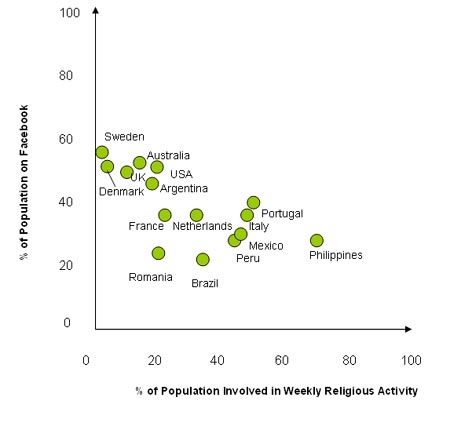Depending on your intent or audience, the rise in the use of Facebook on a global scale can indeed be a phenomenial thing. At the same that such a service is rising in use and monetary valuation, there’s also this implicit desire by faith groups to ride the wave so to speak and make sure that the key ideas and traditions of those faith practices aren’t lost in the shuttle to the walls, fan pages, and likes.
Excapite is a website where many times, that which seems sensible is thrown against the wall and asked if it truly sticks. In a recent post there, Nigel posted a graph comparing the faith book (participation in a weekly religious activity) to activity on Facebook. Well, I’ll first let the graphic speak:

Interesting picture isn’t it? Nigel prefaces this graphic saying:
You see when I crunch of the numbers and I review all the theories and exhortations from the Social Media experts and Tech Gurus about the wonders of social media and the mythical network effect I am left with the only one conclusion. This is not science. This is not economics. This is not mathematics. This is a belief system.
And so I wonder to myself. If it is a new belief system. What belief system is it disrupting? What is disappearing to make way for the great social network revolution?
Strong statement right? Faceboook as a belief system. You’ve read the terms of service, its nothing more than a cannon of beliefs and conditions, none of which were negociated – but agreed to. Similar could be said for nearly any web service that asks for you to invest some amount of time, narrative, and finances. That’s a strong pull, and a common one to many society’s ideas about civilization and interaction. Could Facebook be equated with being a religion? Can the Bible or any religion turn into something more attractive for spiritual, social, and financial growth than Facebook (not ignoring the rich tradition of the Talmud and how it constantly evolves)?
I asked a pastor one time about his perspectives on Facebook after hearing him remind his church community about the announcements and other information they leave to a Facebook fan page rather than a conventional website. Of note, I asked, “are you teaching about Facebook addition with the same energy that you are using to tell people to go there and engage with your community?” He looked at me with a gleam in his eye as if that was one of the best questions that he’s never heard. His response was no – it never cross his mind that Facebook addiction would be something that intense to talk about.
Then there’s that graphic above. I wonder…